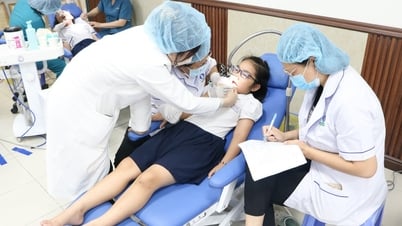Tomatoes are one of the long-recognized "superfoods". Tomatoes contain high levels of antioxidants, fiber, and vitamins. Therefore, consuming tomatoes daily is very beneficial for health.
Nutritional composition of tomatoes
Tomatoes are a highly nutritious fruit, containing many vitamins and minerals. Some of the main nutritional components of tomatoes include:
Carotenoids: Tomatoes are a rich source of carotenoids, including lycopene, beta-carotene, lutein, and zeaxanthin. Carotenoids have been linked to a reduced risk of heart disease, cancer, and aging.
Vitamin C: Tomatoes are rich in vitamin C which supports the immune system and helps reduce the risk of heart disease.
Potassium: Tomatoes are rich in potassium, which helps lower blood pressure, support heart health and nerve function.
Folate: This B vitamin is important for the development of the nervous system. In addition, tomatoes rich in folate also have the function of preventing cardiovascular disease.
Fiber: Tomatoes can help improve digestive function and reduce the risk of bowel disease.

Tomatoes are a fruit with high nutritional value, containing many vitamins and minerals.
The wonderful uses of tomatoes
Tomatoes, whether eaten raw, cooked or juiced, all have wonderful effects. Here are the health benefits of tomatoes:
Tomatoes are rich in antioxidants.
Tomatoes contain a total of four main carotenoids: alpha-carotene, beta-carotene, lutein, and lycopene. These carotenoids may have different benefits. Of these, lycopene is considered to have the highest antioxidant properties of the carotenoids.
Antioxidants in tomatoes can help the body prevent and minimize cell damage caused by free radicals. Therefore, eating tomatoes can help fight chronic diseases caused by free radicals.
Reduce the risk of prostate cancer
Tomatoes are a rich source of antioxidants, especially lycopene, which has been shown to significantly reduce the risk of developing prostate cancer. Regular consumption of tomatoes, tomato juice, and tomato-based products can reduce this risk by up to 15%.
A study in mice found that prostate tumors grew more slowly when mice were fed both tomato powder and broccoli than when they were given supplemental lycopene or fed only broccoli or tomato powder.
Reduce the risk of pancreatic cancer
There is not much scientific evidence to support the claim that eating tomatoes can reduce the risk of pancreatic cancer. However, preliminary studies suggest that the lycopene in tomatoes may help reduce the risk of pancreatic cancer. According to a study from the University of Montreal, a diet rich in tomato products can also reduce the risk of pancreatic cancer by up to 31%.
Eating tomatoes helps regulate blood pressure
Eating tomatoes helps regulate blood pressure because they contain lycopene and potassium. Research also shows that tomato extract can reduce blood pressure in the short term. Lycopene improves blood vessel function, while potassium helps reduce the effects of sodium and tension in blood vessel walls, leading to lower blood pressure. People with high blood pressure should add tomatoes to their healthy diet.
Eating tomatoes helps prevent cardiovascular diseases
One report found that the antioxidants in tomatoes are particularly good at preventing damage to the arteries in the heart, which leads to plaque buildup in the heart arteries.
Tomatoes are rich in lycopene, which can lower LDL cholesterol levels and increase good cholesterol levels. Tomatoes are also a rich source of beta-carotene, folate, and flavonoids, which are beneficial for heart health and help reduce homocysteine and platelet aggregation. Therefore, eating tomatoes helps improve heart health.
Research published by Tufts University found: Men with high blood levels of lycopene were 55% less likely to have a stroke.
Eating tomatoes helps improve skin health
Tomatoes are no substitute for sunscreen, but the lycopene in tomatoes may have a protective effect on the skin. Therefore, eating tomatoes may help protect against erythema or sunburn caused by UV rays. A 2006 study found that after 10 to 12 weeks of eating lycopene from tomatoes, there was a reduction in sensitivity to UV radiation.
According to the United States Department of Agriculture's nutrient database, 1 cup of tomatoes contains about 30 grams of vitamin C. Vitamin C is often found in skin care products. It promotes the growth of new connective tissue, helps repair and speeds up the wound healing process.
Some compounds in tomatoes have anti-inflammatory effects such as: lycopene, beta carotene, lutein, vitamin E, vitamin C. When applied to the skin, these compounds can help relieve pain caused by skin irritation or sunburn.
Vitamin B is essential for skin health. Tomatoes contain vitamins B-1, B-3, B-5, B-6, and B-9. These vitamins have anti-aging properties, reducing age spots and wrinkles. In addition, vitamin B also contributes to cell repair, helping to reduce hyperpigmentation and sun damage.

Using tomatoes every day is very beneficial for health.
Benefits of tomatoes for postpartum women
For postpartum women who are breastfeeding, consuming tomato products can increase the concentration of lycopene in breast milk. However, eating cooked tomatoes is best for the health of mother and baby.
In addition, tomatoes are low-calorie, high-fiber foods that help you feel full while dieting. Therefore, combining tomatoes with low-calorie foods such as peppers and salads is very effective for weight loss.
Benefits of tomatoes for the immune system
Tomatoes also contain beta-carotene (a highly active antioxidant), vitamin E, and vitamin C. A report by the United States Department of Agriculture found that about one-third of Americans get too little vitamin C and nearly half get too little vitamin A. Vitamin C is an important part of a healthy immune system, so eating tomatoes regularly can help your body get the vitamin C it needs.
What should you pay attention to when eating tomatoes?
Here are some tips to maximize the nutritional benefits of tomatoes:
- Tomatoes should be washed before eating to remove dirt, pests and preservatives.
- Fresh tomatoes are a good source of nutrition because they retain vitamins and antioxidants more completely than when cooked with heat. Therefore, you should eat fresh tomatoes to maximize the nutritional benefits.
- You should limit tomato dishes with too much oil or sugar. You can process tomatoes such as: salad, tomato sauce, juice, etc.
- Although tomatoes are very good for your health, you should not eat too much. Especially when you are taking antibiotics or have stomach problems. Eating too many tomatoes can cause indigestion and increase the risk of gastritis.
- Be careful when eating green tomatoes because green tomatoes contain solanine, a poison that can cause poisoning if eaten in excess. Therefore, you should not eat green tomatoes.
- In addition to vitamins and minerals, tomatoes are also naturally acidic. If you are sensitive to natural acids or allergic to tomatoes, using them will cause some reactions such as rashes, itching, redness and other irritation. Therefore, before using tomatoes or tomato juice, you need to test to monitor the reaction.
Source: https://giadinh.suckhoedoisong.vn/tim-thay-chat-chong-ung-thu-tu-loai-qua-quen-thuoc-cua-nhieu-gia-dinh-duoc-vi-nhu-nhan-sam-do-ban-day-cho-viet-172241013171428101.htm







![[Photo] Magical moment of double five-colored clouds on Ba Den mountain on the day of the Buddha's relic procession](https://vphoto.vietnam.vn/thumb/1200x675/vietnam/resource/IMAGE/2025/5/9/7a710556965c413397f9e38ac9708d2f)




























![[Photo] General Secretary To Lam begins official visit to Russia and attends the 80th Anniversary of Victory over Fascism](https://vphoto.vietnam.vn/thumb/1200x675/vietnam/resource/IMAGE/2025/5/8/5d2566d7f67d4a1e9b88bc677831ec9d)
































































Comment (0)